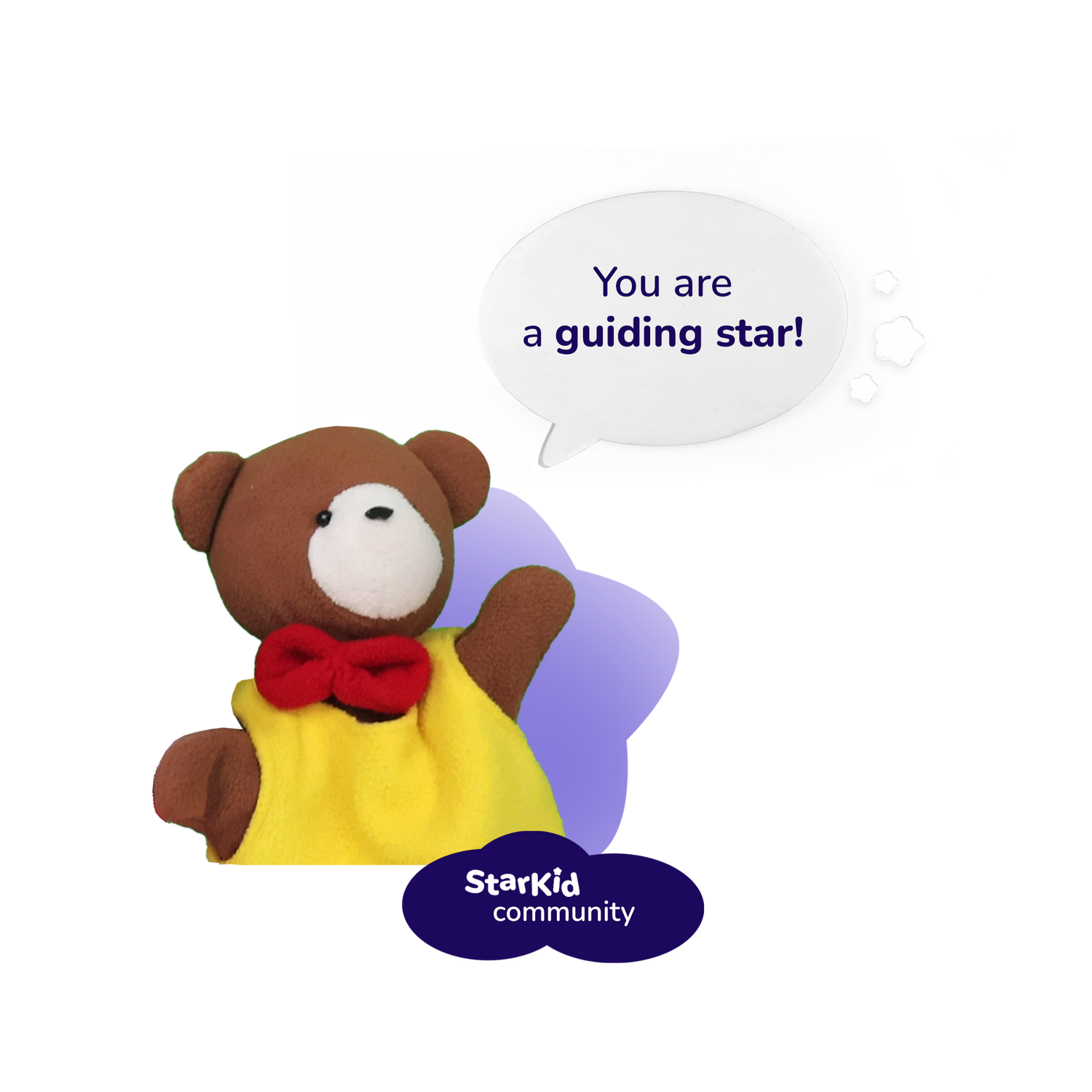🕒 Reading Time: 10-13 minutes
📌 Table of Contents
✅ Welcome to StarKid Universe
✅ Understanding ADHD—and How Mindfulness Fits In
✅ How Mindfulness Helps Children with ADHD
• Better Focus and Concentration
• Improved Impulse Control
• Reduced Stress and Anxiety
• Improved Working Memory
✅ Beyond the Basics: Emotional Regulation and Self-Awareness
✅ Benefits for Parents, Too: Mindful Parenting in the ADHD Journey
✅ Realistic Mindfulness Exercises for ADHD Kids
• Balloon Breathing
• 5-4-3-2-1 Grounding Game
• Animal Walks
• Sensory Glitter Jar
• What to Say Instead of “Calm Down”
✅ A Gentle Note on Limits (and Realistic Expectations)
✅ Expert Highlight: Dr. Mark Bertin & Dr. Lidia Zylowska
✅ Ready to Go Deeper? (StarKid Mindfulness Program)
✅ Final Thoughts: Embracing the Journey
Welcome to StarKid Universe!
Congrats! Your search has led you to the precious place discovered at the endpoint of multicolored rainbows.
We at StarKid Universe strongly support mindfulness as a permanent transformative method that extends beyond current fads. ADHD patients will undeniably benefit from this method. Mindfulness stands as an underutilized asset that parents usually do not leverage for parenting tasks.
This guide presents ways mindfulness assists ADHD children to regulate emotions and increases focus and self-confidence, along with clear instructions for parental implementation.
🌪 Understanding ADHD — and How Mindfulness Fits In
ADHD affects 5–10% of children worldwide and creates fundamental problems with executive functioning, which controls focus, emotional responses, and behavior.
Each child displays ADHD core symptoms either by exhibiting distraction, impulsivity, or hyperactivity. ADHD exists in three official clinical subcategories according to medical classification:
- The predominantly inattentive type of ADHD shows signs of continuous distraction, forgetfulness, and disorganized behavior.
- Children with predominant hyperactivity and impulsivity show a poor state of self-control while displaying fidgeting and excessive talking.
- Combined type: displays symptoms of both.
Some ADHD symptoms result from developmental slowness within the prefrontal cortex, which regulates decision-making, leads to emotional control, and guides goal-oriented actions. Daily tools that help children regulate their behavior should supplement standard interventions of medication and behavioral therapy. That’s where mindfulness comes in:
Mindfulness practice does not require physical immobility or mental emptiness while practicing. People with ADHD should develop the ability to detect their thoughts and body sensations while maintaining self-control over their immediate responses. The ability to recognize emotions provides fundamental transforming power to children who have ADHD. They develop the ability to pause their actions and maintain focused attention because they learn to answer instead of acting impulsively.
Mindfulness teaches people to stay present through practice, which enables them to fulfill ADHD-related learning abilities, but it takes place at a steady pace as each person progresses differently.
🧠 How Mindfulness Helps Children with ADHD
The following section outlines the essential advantages between scientific backing and practice evidence:
1. Better Focus and Concentration
The most fundamental problem ADHD children face involves maintaining their focus during homework tasks, their performance in class, and following school instructions. Mindfulness establishes brain capabilities to stay focused on one aspect without distraction.
According to research in the Journal of Attention Disorders (2012), students between 8 and 12 who took mindfulness sessions demonstrated better attention skills and finished their activities competently (van der Oord et al., 2012).
2. Improved Impulse Control
Children who suffer from ADHD tend to behave without considering their actions first. Through mindfulness, people learn to identify impulses by noticing them in advance, which allows the creation of a brief break to make alternative decisions.
Better awareness about the reaction and self-soothing methods form the core of mindfulness education.
3. Reduced Stress and Anxiety
The stress levels of ADHD children typically surpass typical children’s. The practice makes them experience misunderstanding while feeling excessive or undergoing repetitive correction from adults. Mindfulness provides them with specific tools that help them stabilize their nervous system.
Research indicates that deep breathing and progressive muscle relaxation decrease the stress hormone cortisol and improve emotional control functions.
4. Improved Working Memory
Working order tasks and remembering orders present a challenge to numerous ADHD-affected children. Working memory function strengthens through mindfulness education because it enables students to retain information instantly during each passing.
Practicing mindfulness techniques resulted in children showing significant statistical progress in their working memory abilities, which aided their learning processes and task transitions, according to Zylowska et al. (2008).
💛 Beyond the Basics: Emotional Regulation and Self-Awareness
Let’s not forget some of the less visible—but deeply powerful—benefits:
🌙 Better sleep: Mindfulness improves rest and bedtime routines.
🌱 Emotional regulation: Fewer meltdowns, faster recovery after setbacks.
🌟 Increased self-awareness: Children begin to know their feelings—not be overwhelmed by them.
✨ Benefits for Parents, Too: Mindful Parenting in the ADHD Journey
Caring for a child who has ADHD asks for deeper patience from parents while demanding their full presence and flexibility, yet brings increased happiness with expanded personal growth and new ways to connect. The purpose of mindful parenting is to maintain calmness, but this goal does not require a complete state of calm. It’s about:
- Responding instead of reacting
- Creating safety instead of control
- Self-regulation receives modeling instead of being required from parents
A calm attitude during emotional moments helps children develop better resilience skills by rewiring their brain functions.
🧩 Realistic Mindfulness Exercises for ADHD Kids
The practice of mindfulness does not require anyone to use candle silence or extended stillness. The practice of mindfulness for ADHD children needs to remain brief, yet sensorially focused while remaining enjoyable. Building awareness stands as the main objective rather than enforcing calmness, because you want to establish a secure and appealing environment for your child.
The following practices are effective for most children, particularly when you make adjustments based on their age and movement level:
🟡 1. Balloon Breathing (Ages 4–10)
You should breathe deeply through your nose as though filling a big balloon before letting out a slow mouth exhalation that signals its release toward the sky. Graphics shown with your hands will support visual feedback when you do this. The method works well during school transitions as well as testing periods and before nighttime.
🔵 2. 5-4-3-2-1 Grounding Game (Ages 6+)
List five items you see and four sounds you hear while touching three objects, smelling two things, and one tasteable object. The technique serves to keep a moving or distressed child mentally stable in the current moment.
🟢 3. Mindful Movement or Animal Walks
Students should experiment with moving like a sloth or crawling like a bear or extending their limbs like a cat. Their body awareness improves through this activity, which operates without requiring them to stay seated.
🟠 4. Sensory Glitter Jar
Shake the glass jar and request your kid to observe the glitter movements when it settles. You and your child will observe glitter landing quietly within the glass as you say, “Let’s allow our thoughts to rest in this same way.” Visuals are powerful regulators.
🟣 Parent Tip: What to Say
The alternative statement to "Calm down" becomes:
🗣️ "Let's breathe together."
🗣️ "Are you aware of what your feet experience while resting on the floor?"
Mindfulness doesn’t mean stillness. Mindfulness creates a link to present moments through various enjoyable strategies that aid children in this process.
🌱 A Gentle Note on Limits (and Realistic Expectations)
Mindfulness does not function as an enchanting solution. The usage of mindfulness does not eliminate the necessity for medical care, organized therapeutic approaches, or required educational modifications. And it doesn’t work overnight.
This tool, among others, serves as a useful strategy for controlling ADHD symptoms.
✔ Can be done at home
✔ Is low-cost or free
✔ Helps the entire family — not just the child
The practice helps people develop lifelong emotional well-being capabilities.
The practice requires your sincere exploration combined with patience and curiosity because its purpose is to help you develop together as a family.
Expert Highlight: Dr. Mark Bertin on Mindfulness and ADHD
🌟 Dr. Mark Bertin: Pediatrician & Mindfulness Advocate
Dr. Mark Bertin practices as a developmental pediatrician and mindfulness teacher while also serving as an author to connect evidence-based developmental care methods with mindful awareness principles. Dr. Mark Bertin provides guidance to parents through his publications including Mindful Parenting for ADHD and How Children Thrive, which explain both the behavior and underlying reasons of ADHD in children.
Dr. Bertin demonstrates that mindfulness avoids any attempts to create calmness in children. The real objective of mindfulness centers on creating momentary awareness that allows parents and children to connect better with their challenges without experiencing unnecessary stress.
“The practice of mindfulness creates valuable time for us to choose between responses after stimuli occur. The available space provides us with a healthier alternative to move ahead.”
— Dr. Mark Bertin, Mindful.org Interview
His approach to mindfulness exists to benefit both children and their parental nervous systems.
🌟 Dr. Lidia Zylowska: Clinical Researcher & Trailblazer
The psychiatrist and author who brings important contributions to this field is Dr. Lidia Zylowska, with her work focused on adult ADHD in The Mindfulness Prescription for Adult ADHD. Her work led to the creation of one of the pioneering programs that used mindfulness techniques specifically for ADHD patients.
Her research produced projection-based results demonstrating that mindfulness-based treatment created substantial improvements in inattentiveness and hyperactivity symptoms while improving executive functioning and mood responses (Zylowska et al., 2008).
“The goal is not to eliminate ADHD among participants. Through the provided tools the person becomes more capable of understanding their experiences.”
— Dr. Zylowska
These scientific experts demonstrate through research that mindfulness has proven to become a meaningful tool that helps children with ADHD and their caregivers.
🎓 Ready to Go Deeper?
🎓 Ready to Go Deeper?
At StarKid, we created a supportive, playful program for ADHD children and their families.
✨ It includes:
🎥 Guided videos
📄 Printable focus & emotion tools
🪞 Parent reflection guides
🎲 Playful, sensory-based mindfulness activities
👉 Try the StarKid Mindfulness Program here
Start anytime. We’re here if you have questions. 💛
After your convenience, you can start the program while we remain available to answer any questions you have.
🧘♀️ Final Thoughts: Embracing the Journey
StarKid believes that every obstacle opens doors toward empathy, innovative thinking, and relational bonds.
Mindfulness does not provide complete solutions, but it creates an exceptional time for deep breathing and the opportunity to approach tough days with serenity.
Your child doesn’t need perfection.
They need your presence.
And that, truly, is enough.
References
Bertin, M. (2015). Mindful Parenting for ADHD: A Guide to Cultivating Calm, Reducing Stress, and Helping Children Thrive. New Harbinger Publications.
https://www.newharbinger.com/9781626251793/mindful-parenting-for-adhd
Zylowska, L., Ackerman, D. L., Yang, M. H., & Shapiro, D. (2008). Mindfulness meditation training in adults and adolescents with ADHD: A feasibility study. Journal of Attention Disorders, 11(6), 737–746.
https://doi.org/10.1177/1087054707308502
van der Oord, S., et al. (2012). Mindfulness Training for Children with ADHD and Mindful Parenting. Journal of Attention Disorders. https://www.ncbi.nlm.nih.gov/pmc/articles/PMC3267931/
Zylowska, L., et al. (2008). Mindfulness Meditation Training in Adults and Adolescents with ADHD. Journal of Attention Disorders.
Bertin, M. (Interview). Mindful Parenting for ADHD. https://www.mindful.org/mindful-parenting-for-adhd-an-interview-with-dr-mark-bertin/
Zylowska, L. (2012). The Mindfulness Prescription for Adult ADHD. Trumpeter Books.
Stephanie Sarkis. (Interview with Dr. Zylowska). https://stephaniesarkis.com/blog/adhd-mindfulness-an-interview-with-lidia-zylowska-md


